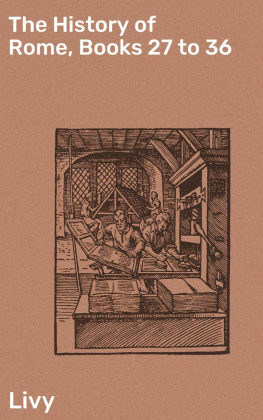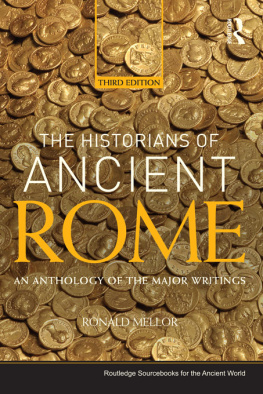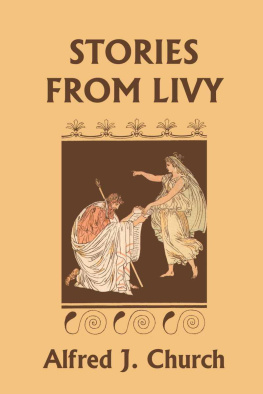BOOK XXXVII.
Lucius Cornelius Scipio the consul, having as lieutenant Publius Scipio Africanus, (who had declared that he would be his brothers lieutenant if the province of Greece was decreed to him, when that province appeared likely to be assigned to Caius Llius, who had great influence in the senate,) set out to wage war against Antiochus, and was the first Roman general that ever passed over into Asia. milius Regillus, with the assistance of the Rhodians, fought successfully against the royal fleet of Antiochus at Myonnesus. The son of Africanus, having been taken by Antiochus, was sent back to his father. Manius Acilius Glabrio triumphed over Antiochus, whom he had driven out of Greece, and over the tolians. Antiochus being subsequently conquered by Lucius Cornelius Scipio, with the aid of Eumenes, son of Attalus, and king of Pergamus, peace was granted to him on these termsthat he should evacuate all the provinces on this side Mount Taurus. The kingdom of Eumenes, through whose assistance Antiochus had been conquered, was enlarged. Some states were granted to the Rhodians too, who also had assisted them. The colony of Bononia was founded. milius Regillus, who had conquered the admirals of Antiochus in a naval engagement, triumphed. Lucius Cornelius Scipio, who had brought the war with Antiochus to a conclusion, was called Asiaticus, attaining to an equality with his brother by this surname.
Lucius Cornelius Scipio and Caius Llius being consuls, no business, after the duties of religion, was transacted in the senate prior to that of the tolians. Not only their ambassadors were urgent, because they had a truce of a short period, but they were aided by Titus Quinctius also, who had then returned to Rome from Greece. The tolians, as being persons to whom there was more hope in the mercy of the senate than in their cause, acted suppliantly, weighing their by-gone services against their recent misconduct. But when present, they were importuned by questions of the senators, wringing from them an acknowledgment of their guilt rather than replies, and when ordered to depart from the senate, they caused a great contest. Resentment had more power in their case than compassion; for the senate were incensed against them not merely as enemies, but as an uncivilized and unsocial race. After it had been contested several days, it was at last resolved, that peace should neither be granted nor refused. Two conditions were offered them, either that they should yield to the senate unconditional power over them, or pay one thousand talents, and have the same friends and enemies. To them, desirous to elicit in what things they should give to the senate unconditional power over them, no positive answer is given; but being thus dismissed, without having concluded a peace, they were ordered to quit the city that very day, and Italy within fifteen days. They then began to debate concerning the provinces for the consuls. Both of these wished for Greece. Llius had a powerful interest in the senate; and when the senate had ordered that the consuls should either cast lots for the provinces, or settle them between themselves, he observed, that they would act with more propriety in leaving that matter to the wisdom of the senators, than to the decision of lot. To this Scipio, an answer being given that he would take advice how he ought to act, having spoken to his brother alone, and having been desired by him to leave it unhesitatingly to the senate, answered his colleague that he would do what he recommended. When this plan, either original or supported by precedents of a record now lost by antiquity, being referred to the senate, had aroused them by the expectation of a contest, Publius Scipio Africanus said, that if they decreed that province to his brother, Lucius Scipio, he would go along with him, as his lieutenant-general. This proposal being received with universal approbation, put an end to all dispute. The senate were well pleased to make the trial, whether king Antiochus should have more effectual aid in the vanquished Hannibal, or the Roman consul and legions in his conqueror Africanus; and they almost all voted Greece to Scipio, and Italy to Llius. The prtors then cast lots for their provinces: Lucius Aurunculeius obtained the city jurisdiction; Cneius Fulvius, the foreign; Lucius milius Regillus, the fleet; Publius Junius Brutus, the Tuscans; Marcus Tuccius, Apulia and Bruttium; and Caius Atinius, Sicily.
Then to the consul to whom the province of Greece had been decreed, in addition to the army which he was about to receive from M. Acilius, (but they were two legions,) three thousand Roman foot and one hundred horse, and of the Latin confederates five thousand foot and two hundred horse, are added as a reinforcement; and it was further ordered, that if, when he arrived in his province, he would judge it conducive to the public interest, he should be at liberty to carry over the army into Asia. To the other consul was decreed an army entirely new; two Roman legions, and of the Latin confederates fifteen thousand foot and six hundred horse. Quintius Minucius was ordered to remove his forces out of Liguria (for he had written, that the province was completely subdued, and that the whole nation of the Ligurians had surrendered) into the country of the Boians, and to give up the command to Publius Cornelius, proconsul. The two city legions, enlisted the year before, about to be brought home from the country in which Cornelius had fined the conquered Boians, were assigned to Marcus Tuccius, prtor, together with fifteen thousand foot and six hundred horse, of the Latin confederates, to occupy Apulia and Bruttium. Orders were given to Aulus Cornelius, a prtor of the preceding year, who occupied Bruttium with an army, that if the consul judged it proper, he should transport his legions into. tolia, and give them to Manius Acilius, provided the latter was inclined to remain there; but if Acilius wished to come to Rome, that then Aulus Cornelius should stay in tolia with that army. It was resolved that Caius Atinius Labeo should receive from Marcus milius the province of Sicily, and the army there; and should, if he deemed it proper, enlist in the province itself two thousand foot and one hundred horse, for a reinforcement. Publius Junius Brutus was ordered to raise a new army for Tuscany, consisting of one Roman legion, and ten thousand foot of the allies and Latin nation, and four hundred horse. Lucius milius, whose province was the sea, was ordered to receive from Marcus Junius, prtor of the former year, twenty ships of war, with their crews, and himself to enlist one thousand marines and two thousand foot soldiers, with which ships and soldiers he was to sail to Asia, and receive the command of the fleet from Caius Livius. To the governors of the two Spains and Sardinia, their command is prolonged for a year, and the same armies were decreed them. Sicily and Sardinia were, this year, assessed in two-tenths of their corn. All the corn from Sicily was ordered to be carried into tolia, to the army there; of that to be collected from Sardinia, one-half to Rome, and the other half into tolia, for the same use as the corn from Sicily.










